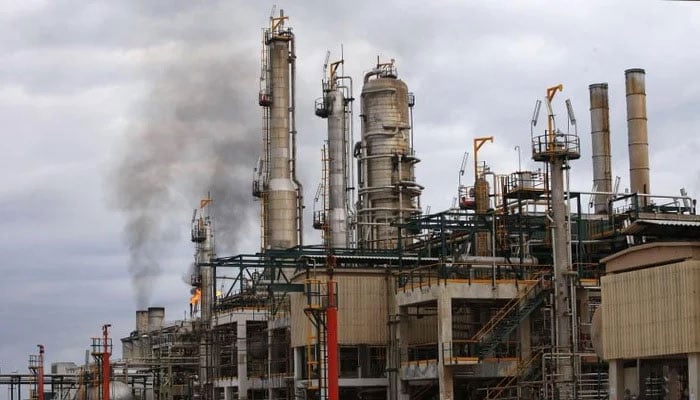Refinery upgrades crucial to overcome sector challenges: report
KARACHI: Refinery upgrade projects are essential to alleviate persistent challenges in the sector, which continue to heighten business risks in the absence of modernisation initiatives, says a report by the Pakistan Credit Rating Agency (Pacra).
The approval and implementation of refinery policies are critical for the sector’s growth, as these measures would not only enhance gross refining margins (GRMs) but also provide much-needed tax relief to the struggling industry.
GRM, a key indicator of a refinery’s operational efficiency, represents the difference between total revenue from refined product sales and the cost of crude oil. Higher GRMs indicate greater value addition per barrel of crude processed, underscoring the importance of policy support to achieve operational improvements.
The government is also exploring collaboration with Saudi Arabia to establish a new greenfield refinery. This facility, capable of producing hydrocarbons and renewables, would significantly bolster Pakistan’s refining capacity and align the country with global energy consumption trends, according to industry insights.
Although local petroleum product production increased by 7.7 per cent year-on-year in FY24, revenue per metric tonne (MT) of refined products grew by 27.6 per cent, a slowdown compared to the 44 per cent growth recorded in FY23. Local refineries, constrained by outdated hydro-skimming technology, have faced reduced refining margins. Between CY2017 and CY2022, the average refining margin stood at 23 per cent, significantly lower than refineries equipped with advanced deep-conversion technologies like cracking and coking.
To address these inefficiencies, the government has mandated all refineries to transition from hydro-skimming to deep-conversion technologies under the Brownfield Policy. This upgrade must be completed within six years from August 2023. Refineries are currently engaging with the government for further policy clarity and have expressed willingness to expand operations.
The Petroleum Division has required refineries to align their production processes with Euro-V specifications within the stipulated six-year period. To support this transition, the government has offered incentives and tariff protections a minimum customs duty of 10 per cent on imported motor gasoline and high-speed diesel for six years from the policy’s notification date; customs duties exceeding 10 per cent will be deposited into the Inland Freight Equalization Margin (IFEM) pool, while duties on crude oil will be reimbursed to refineries via IFEM; and a 10 per cent tariff protection (deemed duty) will be applicable to the ex-refinery price of motor gasoline and diesel for six years from the policy notification date.
These measures aim to modernise the refining sector, improve operational efficiency, and enhance the country’s
-
 Demi Lovato Leaves Fans Disappointed With Unexpected Announcement
Demi Lovato Leaves Fans Disappointed With Unexpected Announcement -
 Pacers Vs Knicks Overtime Thriller Ends In Heartbreak For New York
Pacers Vs Knicks Overtime Thriller Ends In Heartbreak For New York -
 Who Owns The Ambassador Bridge? New Report Links Owner Matthew Moroun To Trump’s Threat
Who Owns The Ambassador Bridge? New Report Links Owner Matthew Moroun To Trump’s Threat -
 ICE Detention Center Plan Sparks Controversy In Maryland As Lawmakers Push Back
ICE Detention Center Plan Sparks Controversy In Maryland As Lawmakers Push Back -
 Blood Pressure Medication Recalled After Wrong Tablets Found In Bottles
Blood Pressure Medication Recalled After Wrong Tablets Found In Bottles -
 Why Ariana Grande Wants A 'tiny Mouse' To Play Her In Biopic?
Why Ariana Grande Wants A 'tiny Mouse' To Play Her In Biopic? -
 Wind Chill Returns With Brutal Cold As Polar Vortex Stalls Over Canada
Wind Chill Returns With Brutal Cold As Polar Vortex Stalls Over Canada -
 Princess Beatrice, Eugenie ‘do Not Want To Be Seen In Public’ Because Of Dad
Princess Beatrice, Eugenie ‘do Not Want To Be Seen In Public’ Because Of Dad -
 Costco $20 Rule Explained As Employee Pay Climbs Across North America
Costco $20 Rule Explained As Employee Pay Climbs Across North America -
 Strange Incident Happened At Nancy Guthrie's Home On Abduction's 10th Day
Strange Incident Happened At Nancy Guthrie's Home On Abduction's 10th Day -
 Tumbler Ridge School Lockdown Underway As RCMP Investigate School Shooting
Tumbler Ridge School Lockdown Underway As RCMP Investigate School Shooting -
 Royal Family Knows There Can Be ‘no More Glossing’ Of Andrew Downfall
Royal Family Knows There Can Be ‘no More Glossing’ Of Andrew Downfall -
 Britney Spears Quietly Parts Ways With Her Music Catalog: Report
Britney Spears Quietly Parts Ways With Her Music Catalog: Report -
 Princess Diana Bodyguard Suspected ‘she Could Die’: Here’s How
Princess Diana Bodyguard Suspected ‘she Could Die’: Here’s How -
 Teddi Mellencamp Marks Huge Milestone With Emotional Message Amid Cancer
Teddi Mellencamp Marks Huge Milestone With Emotional Message Amid Cancer -
 Shamed Andrew To ‘kiss And Tell’ After Dip In Popularity
Shamed Andrew To ‘kiss And Tell’ After Dip In Popularity




